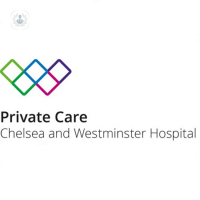What is gestational diabetes?
Sometimes during pregnancy, women can develop high blood sugar levels, but typically this will disappear after giving birth. Gestational diabetes can occur at any point during pregnancy, however, it most commonly appears in the second half of pregnancy.
A specialist consultant endocrinologist or obstetrician will help with the diagnosis and treatment of this condition.

What is the prognosis of gestational diabetes?
Gestational diabetes usually resolves itself after giving birth, however, during pregnancy it can affect both the mother’s and baby’s health. If it is caught early and managed, the risk of problems occurring is reduced. Additionally, if you have gestational diabetes, your risk of developing type two diabetes in the future increases.
This condition increases the risk of:
- the need for induced labour or caesarean section
- the baby is born large during childbirth
- premature birth
- preeclampsia
- still birth
- the baby developing jaundice after birth
- polyhydramnios (excess of amniotic fluid)
Symptoms of gestational diabetes
Often there are no symptoms related to gestational diabetes, however, some women may experience the following if their blood sugar levels become too high (hyperglycaemia):
- dry mouth
- increased thirst
- frequent urges to urinate
- feeling tired
- blurred vision
Unfortunately, many of these symptoms are also typical of pregnancy itself.
Medical tests to diagnose gestational diabetes
During the first antenatal appointment (8-12th week of pregnancy), an assessment will be carried out to identify the risk of developing gestational diabetes (if your BMI is over 30, if your family has diabetes, if you have had gestational diabetes on previous pregnancies, or if you are of Asian, Middle Eastern or African-Caribbean origin). You will also have an oral glucose tolerance test (OGTT) in the 24-28th week of pregnancy in which your blood is tested in the morning before you have eaten, and again after the consumption of a glucose drink.
What are the causes of gestational diabetes?
Whilst the exact cause of gestational diabetes is still unknown, it is more than likely that hormones are involved. During pregnancy, larger amounts of human placental lactogen (hPL) and hormones that increase insulin resistance are released. Whilst such hormones help to protect your pregnancy, they can lead to insulin resistance, which if it becomes too strong will cause the blood sugar levels to rise.
Can gestational diabetes be prevented?
Whilst there is no guarantee in preventing gestational diabetes, you can decrease your risk by:
- losing weight before pregnancy if you are overweight or have a BMI of over 30
- staying active during pregnancy
- eating healthy food
Treatments for gestational diabetes
If you are diagnosed with gestational diabetes, you will be told to test your blood sugar levels with a testing kit before and after meals. You will also be given dietary advice on which foods can help regulate blood sugar levels. Some women, however, will require insulin injections as well to control blood sugar. Furthermore, women with this condition will be closely monitored throughout their pregnancy to avoid the risk of complications occurring.
Which type of specialist treats gestational diabetes?
Gestational diabetes would be treated by an obstetrician and gynaecologist, as well as endocrinologists.
02-11-2019 09-26-2023Gestational diabetes
Ms Vinita Singh - Obstetrics & gynaecology
Created on: 02-11-2019
Updated on: 09-26-2023
Edited by: Jay Staniland
What is gestational diabetes?
Sometimes during pregnancy, women can develop high blood sugar levels, but typically this will disappear after giving birth. Gestational diabetes can occur at any point during pregnancy, however, it most commonly appears in the second half of pregnancy.
A specialist consultant endocrinologist or obstetrician will help with the diagnosis and treatment of this condition.

What is the prognosis of gestational diabetes?
Gestational diabetes usually resolves itself after giving birth, however, during pregnancy it can affect both the mother’s and baby’s health. If it is caught early and managed, the risk of problems occurring is reduced. Additionally, if you have gestational diabetes, your risk of developing type two diabetes in the future increases.
This condition increases the risk of:
- the need for induced labour or caesarean section
- the baby is born large during childbirth
- premature birth
- preeclampsia
- still birth
- the baby developing jaundice after birth
- polyhydramnios (excess of amniotic fluid)
Symptoms of gestational diabetes
Often there are no symptoms related to gestational diabetes, however, some women may experience the following if their blood sugar levels become too high (hyperglycaemia):
- dry mouth
- increased thirst
- frequent urges to urinate
- feeling tired
- blurred vision
Unfortunately, many of these symptoms are also typical of pregnancy itself.
Medical tests to diagnose gestational diabetes
During the first antenatal appointment (8-12th week of pregnancy), an assessment will be carried out to identify the risk of developing gestational diabetes (if your BMI is over 30, if your family has diabetes, if you have had gestational diabetes on previous pregnancies, or if you are of Asian, Middle Eastern or African-Caribbean origin). You will also have an oral glucose tolerance test (OGTT) in the 24-28th week of pregnancy in which your blood is tested in the morning before you have eaten, and again after the consumption of a glucose drink.
What are the causes of gestational diabetes?
Whilst the exact cause of gestational diabetes is still unknown, it is more than likely that hormones are involved. During pregnancy, larger amounts of human placental lactogen (hPL) and hormones that increase insulin resistance are released. Whilst such hormones help to protect your pregnancy, they can lead to insulin resistance, which if it becomes too strong will cause the blood sugar levels to rise.
Can gestational diabetes be prevented?
Whilst there is no guarantee in preventing gestational diabetes, you can decrease your risk by:
- losing weight before pregnancy if you are overweight or have a BMI of over 30
- staying active during pregnancy
- eating healthy food
Treatments for gestational diabetes
If you are diagnosed with gestational diabetes, you will be told to test your blood sugar levels with a testing kit before and after meals. You will also be given dietary advice on which foods can help regulate blood sugar levels. Some women, however, will require insulin injections as well to control blood sugar. Furthermore, women with this condition will be closely monitored throughout their pregnancy to avoid the risk of complications occurring.
Which type of specialist treats gestational diabetes?
Gestational diabetes would be treated by an obstetrician and gynaecologist, as well as endocrinologists.


How does my diabetes affect my pregnancy?
By Dr Bobby Huda
2024-12-02
Many pregnant diabetic women will have a healthy baby and birth, but there is a risk of complications to both the mother and the child and it is important to be aware of these. The most important thing to do if you are diabetic and planning on having children is to manage your diabetes well, both before, during and after pregnancy. Dr Bobby Huda, a leading endocrinologist, explains how diabetes affects pregnancy and how your treatment for diabetes can change as a result of being pregnant. See more


Your expert guide to diabetes during pregnancy
By Ms Vinita Singh
2024-11-27
Diabetes is a chronic condition that occurs either when the pancreas doesn’t produce enough insulin or when the pancreas produces insulin that the body can’t use. Having diabetes can increase the risk of serious health complications during the course of your pregnancy, and even before becoming pregnant. Ms Vinita Singh, renowned consultant obstetrician, explains more. See more


Gestational diabetes and pregnancy
By Dr Bobby Huda
2024-11-23
Endocrinologist Dr Bobby Huda talks about how to achieve a successful pregnancy with gestational diabetes, the symptoms women might experience with gestational diabetes and the health risks that they may have to face throughout their pregnancy. See more


Gestational diabetes: how can it affect pregnancy?
By Dr Rebecca Scott
2024-11-21
Gestational diabetes is a condition where a pregnant woman’s blood sugar levels are high only during pregnancy. The condition improves when the baby is born. Gestational diabetes is very common, affecting approximately 16% of pregnancies in the UK. See more
Experts in Gestational diabetes
-
Dr Rasha Mukhtar
Endocrinology, diabetes & metabolismExpert in:
- Diabetes
- Insulin pump
- Thyroid disorders
- Adrenal gland disorders
- Gestational diabetes
- Weight loss
-
Ms Vinita Singh
Obstetrics & gynaecologyExpert in:
- Pregnancy
- High-risk pregnancy
- Gestational diabetes
- Controlling risk pregnancy and birthing
- Childbirth
- Caesarean
-
Dr Shanthi Chandran
Endocrinology, diabetes & metabolismExpert in:
- Diabetes
- Gestational diabetes
- Insulin pump
- Thyroid
- Parathyroid gland
- Adrenal gland disorders
-
Dr Rebecca Scott
Endocrinology, diabetes & metabolismExpert in:
- Gestational diabetes
- Pregnancy
- Infertility
- Thyroid disorders
- Diabetes
- Polycystic ovary syndrome (PCOS)
-
Dr Seni Subair
Obstetrics & gynaecologyExpert in:
- Postpartum depression
- Gestational diabetes
- Caesarean
- High-risk pregnancy
- Antenatal care
- Childbirth
- See all

The Parkside Suite Heatherwood
The Parkside Suite Heatherwood
Heatherwood Hospital, High Street, SL5 8AA, Berkshire
No existe teléfono en el centro.
By using the telephone number provided by TOP DOCTORS, you automatically agree to let us use your phone number for statistical and commercial purposes. For further information, read our Privacy Policy
Top Doctors

Private Care at Chelsea and Westminster Hospital
Private Care at Chelsea and Westminster Hospital
Chelsea and Westminster Hospital, 369 Fulham Rd.
No existe teléfono en el centro.
By using the telephone number provided by TOP DOCTORS, you automatically agree to let us use your phone number for statistical and commercial purposes. For further information, read our Privacy Policy
Top Doctors

ObGyn Matters London
ObGyn Matters London
The Portland Hospital, 212 Great Portland Street, W1W 5QN
No existe teléfono en el centro.
By using the telephone number provided by TOP DOCTORS, you automatically agree to let us use your phone number for statistical and commercial purposes. For further information, read our Privacy Policy
Top Doctors
-
The Parkside Suite Heatherwood
Heatherwood Hospital, High Street, SL5 8AA, Berkshire, AscotExpert in:
- General Surgery
- Orthopaedic surgery
- Plastic surgery, reconstructive and aesthetics
- Obstetrics and Gynaecology
- Ophthalmology
- Urology
-
Private Care at Chelsea and Westminster Hospital
Chelsea and Westminster Hospital, 369 Fulham Rd., Central LondonExpert in:
- General Surgery
- Dermatology
- Paediatric Dermatology
- Paediatrics
- Preventive paediatrics
- Adult and paediatric services
-
ObGyn Matters London
The Portland Hospital, 212 Great Portland Street, W1W 5QN, Central LondonExpert in:
- Maternity care
- Diagnostic Imaging
- Endometriosis
- Fibroids
- Obstetrics and Gynaecology
- Women’s health
- See all
- Most viewed diseases, medical tests, and treatments
- Menopause support
- Pelvic ultrasound
- Hormone therapy
- Complex endometriosis
- Maternal mental health
- Autoimmune diseases
- Nipple discharge
- Minimal access surgery (keyhole surgery)
- Vaginal dryness
- Pelvic pain syndrome







